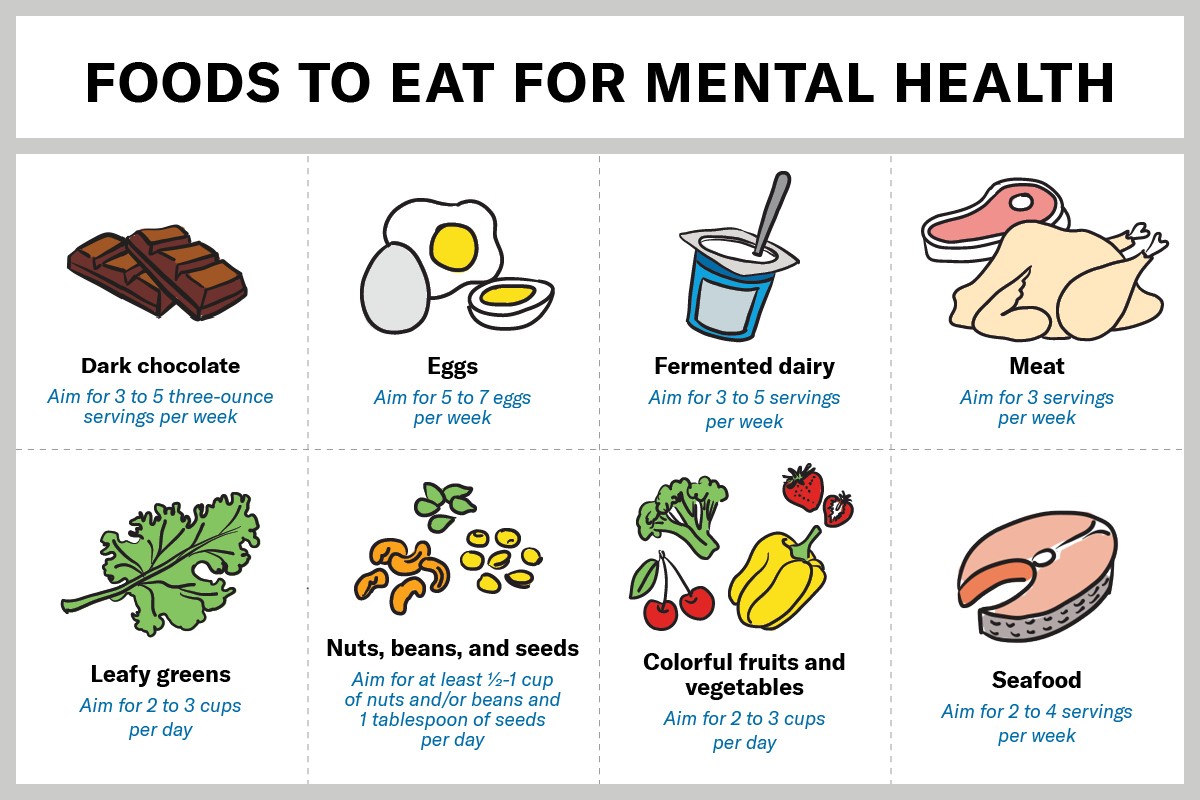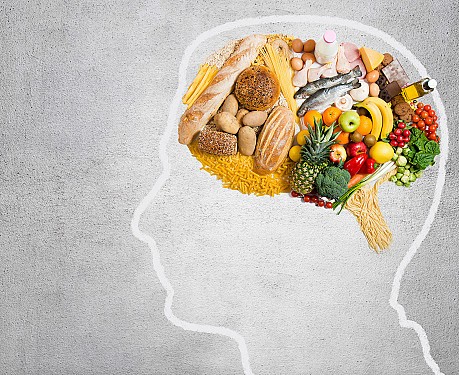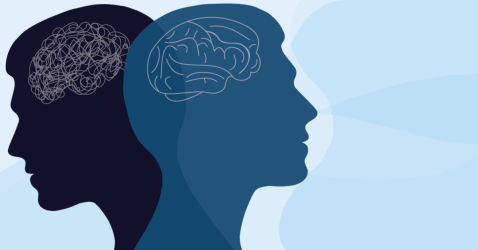Specific Foods That Can Support Emotional Well-being
Did you know that what you eat can have a direct impact on your mental health? That’s right! Nutrition plays a crucial role in promoting emotional well-being. Whether it’s managing stress, improving mood, or boosting brain function, the food you consume can greatly affect your mental state. In this article, we’ll explore the link between nutrition and mental health, and discover if there are specific foods or diets that can support your emotional well-being. Get ready to learn about the power of nourishing your mind and body!

The Connection Between Nutrition and Mental Health
Understanding the link
When it comes to mental health, nutrition plays a crucial role in supporting emotional well-being. The food you eat can have a profound impact on your brain function and mood. Research has shown that certain nutrients can help improve mental health, while a poor diet can contribute to the development or worsening of mental health conditions such as depression and anxiety.
Effects of poor nutrition on mental health
Poor nutrition can have detrimental effects on mental health. Consuming a diet that is high in processed foods, refined sugars, and unhealthy fats can lead to inflammation in the body. This inflammation can have a negative impact on brain function and contribute to the development of mental health disorders. Additionally, diets that are lacking in important nutrients can lead to deficiencies that can impair brain function and worsen symptoms of mental health conditions.
The role of nutrition in brain function
Nutrition plays a key role in brain function. The brain requires a steady supply of nutrients to support its complex processes. Certain nutrients are essential for the production of neurotransmitters, which are chemicals that transmit signals between nerve cells in the brain. Neurotransmitters play a crucial role in regulating mood, and imbalances can contribute to the development of mental health disorders. By consuming a diet rich in the nutrients that support brain function, you can help promote optimal mental health.
Key Nutrients for Mental Well-being
Omega-3 Fatty Acids
Omega-3 fatty acids are a type of healthy fat that are crucial for brain health. These fatty acids, particularly EPA and DHA, have been shown to have antidepressant and anti-anxiety effects. They help regulate neurotransmitter function and reduce inflammation in the brain. You can find omega-3 fatty acids in fatty fish such as salmon and mackerel, as well as in walnuts and flaxseed.
B Vitamins
B vitamins, particularly B6, B9 (folate), and B12, play a vital role in brain function. These vitamins are involved in the synthesis of neurotransmitters such as serotonin and dopamine, which regulate mood and motivation. Deficiencies in B vitamins have been linked to an increased risk of depression and other mental health disorders. Good food sources of B vitamins include leafy greens, legumes, and fortified cereals.
Vitamin D
Vitamin D, also known as the sunshine vitamin, is essential for overall health, including mental well-being. It plays a role in the production of serotonin, a neurotransmitter that helps regulate mood. Many people are deficient in vitamin D, especially during the winter months when sun exposure is limited. You can find vitamin D in fatty fish, fortified dairy products, and through sunlight exposure.
Magnesium
Magnesium is a mineral that is involved in over 300 biochemical reactions in the body, including those that support brain function. It helps regulate neurotransmitters and has been shown to have a calming effect on the nervous system. Foods rich in magnesium include leafy greens, nuts, seeds, and whole grains.
Probiotics
The health of your gut microbiome, which is the community of bacteria in your digestive system, is closely linked to mental health. Probiotics, which are beneficial bacteria, can help support a healthy gut microbiome and improve mental well-being. Fermented foods such as yogurt, kefir, and sauerkraut are excellent sources of probiotics.
The Impact of Macronutrients on Mental Health
Carbohydrates and Serotonin
Carbohydrates are often misunderstood when it comes to mental health. While it’s true that excessive consumption of refined carbohydrates can lead to blood sugar fluctuations and mood swings, complex carbohydrates can actually support mental well-being. Complex carbohydrates, such as those found in whole grains and vegetables, are digested more slowly, providing a steady release of glucose into the bloodstream. This steady supply of glucose supports the production of serotonin, a neurotransmitter that promotes feelings of calmness and happiness.
Protein and Neurotransmitter Production
Protein is an essential macronutrient that is necessary for the production of neurotransmitters in the brain. Amino acids, the building blocks of protein, are used to synthesize neurotransmitters such as dopamine and norepinephrine. Including high-quality sources of protein, such as lean meats, poultry, fish, beans, and legumes, in your diet can help support optimal neurotransmitter function.
Fats and Brain Health
Healthy fats, such as those found in avocados, nuts, seeds, and olive oil, are essential for brain health. The brain is composed of approximately 60% fat, and consuming an adequate amount of healthy fats is crucial for optimal brain function. These fats help support the structure and integrity of brain cells, and they also play a role in regulating inflammation in the brain.
Specific Foods That Promote Emotional Well-being
Leafy Greens and Their Benefits
Leafy greens, such as spinach, kale, and Swiss chard, are packed with nutrients that support brain health. They are rich in folate, a B vitamin that plays a crucial role in neurotransmitter production. Additionally, leafy greens are a good source of magnesium, which helps regulate mood and reduce anxiety.
Fish and Omega-3 Fatty Acids
Fatty fish, such as salmon, sardines, and trout, are excellent sources of omega-3 fatty acids. These healthy fats have been shown to reduce symptoms of depression and anxiety. Including fish in your diet at least twice a week can provide a significant boost to your mental well-being.
Nuts and Seeds for Stress Relief
Nuts and seeds, such as almonds, walnuts, and flaxseeds, are rich in nutrients that support brain function. They are a good source of magnesium, which helps reduce stress and anxiety. Additionally, they provide healthy fats and protein, which help stabilize blood sugar levels and promote a balanced mood.
Whole Grains and Stable Energy Levels
Whole grains, such as quinoa, brown rice, and whole wheat bread, provide a steady release of glucose into the bloodstream. This steady supply of energy helps prevent blood sugar fluctuations, which can lead to mood swings and irritability. Including whole grains in your diet can help promote stable energy levels and support emotional well-being.
Probiotic-Rich Foods for Gut-Brain Connection
Foods that are rich in probiotics, such as yogurt, kefir, and fermented vegetables, can support a healthy gut microbiome. The gut microbiome plays a crucial role in mental health, as it influences neurotransmitter production and regulates inflammation in the body. Including probiotic-rich foods in your diet can help support a healthy gut-brain connection and promote emotional well-being.

The Impact of Sugar and Processed Foods on Mental Health
Negative Effects of Sugar on Mood
Consuming excessive amounts of refined sugar can have a negative impact on mood. When you consume sugary foods or drinks, your blood sugar levels spike, leading to a surge of energy. However, this energy boost is short-lived, and once your blood sugar levels drop, you may experience fatigue, irritability, and mood swings. Additionally, high sugar intake has been linked to an increased risk of depression and anxiety.
Processed Foods and Inflammation
Processed foods, such as fast food, frozen meals, and sugary snacks, are often high in unhealthy fats, added sugars, and artificial ingredients. These ingredients can contribute to inflammation in the body, including the brain. Chronic inflammation has been linked to an increased risk of mental health disorders such as depression and Alzheimer’s disease. Choosing whole, unprocessed foods can help reduce inflammation and support optimal mental health.
The Importance of a Balanced Diet
While it’s important to be mindful of the foods that can negatively impact mental health, it’s also crucial to focus on maintaining a balanced diet. A balanced diet includes a variety of nutrient-dense foods from all food groups. Eating a wide range of fruits, vegetables, whole grains, lean proteins, and healthy fats ensures that you are providing your body and brain with the necessary nutrients for optimal function. By following a balanced diet, you can support your mental well-being and overall health.
The Mediterranean Diet and Its Influence on Mental Well-being
Overview of the Mediterranean Diet
The Mediterranean diet is a way of eating that is inspired by the traditional dietary patterns of countries bordering the Mediterranean Sea, such as Greece and Italy. It is characterized by an abundance of fruits, vegetables, whole grains, legumes, nuts, seeds, and healthy fats, such as olive oil. Lean proteins, such as fish and poultry, are consumed in moderate amounts, while red meat is limited. This diet is also known for its moderate consumption of red wine.
Benefits for Mental Health
The Mediterranean diet is consistently associated with a lower risk of mental health disorders and improved emotional well-being. Studies have shown that following a Mediterranean-style eating pattern can reduce the risk of depression, anxiety, and cognitive decline. The abundance of fruits, vegetables, and whole grains provide important nutrients for brain health, while the healthy fats and lean proteins support optimal neurotransmitter function.
Specific Components and Their Effects
The components of the Mediterranean diet have specific effects on mental health. Olive oil, a staple in this eating pattern, is rich in monounsaturated fats, which have been shown to reduce inflammation in the body. The high consumption of fruits and vegetables provides essential vitamins, minerals, and antioxidants that support brain health. The moderate consumption of red wine, in combination with a nutrient-rich diet, has been associated with a lower risk of depression. Overall, the Mediterranean diet provides a well-rounded approach to nutrition that supports mental well-being.

Potential Mental Health Benefits of a Vegan or Vegetarian Diet
Plant-based Diets and Lower Risk of Mental Disorders
Research suggests that following a vegan or vegetarian diet may be associated with a lower risk of mental health disorders. Plant-based diets are typically high in fiber, vitamins, minerals, and antioxidants, which support brain health. Additionally, these diets are often lower in saturated and trans fats, which have been linked to an increased risk of depression and anxiety. However, it is important to ensure that you are getting an adequate intake of key nutrients such as vitamin B12, iron, and omega-3 fatty acids when following a plant-based diet.
Impact of Plant Foods on Gut Health and Mood
Plant foods, such as fruits, vegetables, whole grains, legumes, and nuts, are rich in fiber and prebiotics, which promote a healthy gut microbiome. The gut microbiome plays a crucial role in mental health, as it influences neurotransmitter production and regulates inflammation in the body. Consuming plant foods can support a healthy gut-brain connection and contribute to improved mood and emotional well-being.
Considerations for Proper Nutrient Intake
While a vegan or vegetarian diet can provide numerous health benefits, it is important to ensure that you are meeting your nutrient needs. Plant-based sources of certain nutrients, such as vitamin B12, iron, and omega-3 fatty acids, may be less bioavailable than animal-based sources. It is recommended to incorporate fortified foods or supplements to ensure you are getting an adequate intake of these nutrients. Consulting with a registered dietitian can help you create a well-balanced plant-based eating plan that supports both your physical and mental health.
The Gut-Brain Axis: How Gut Health Affects Mental Health
Understanding the Gut-Brain Connection
The gut-brain connection refers to the bidirectional communication between the gut and the brain. The gut contains a complex network of neurons known as the enteric nervous system, often referred to as the “second brain.” This network of neurons communicates with the brain through the vagus nerve and produces neurotransmitters that influence mood and cognition. Additionally, the gut is home to trillions of bacteria, collectively known as the gut microbiome, which also play a vital role in mental health.
Microbiota and Neurotransmitter Production
The gut microbiota, or the community of bacteria in the gut, produce a variety of neurotransmitters that influence brain function and mental health. For example, certain strains of bacteria produce gamma-aminobutyric acid (GABA), a neurotransmitter that has calming effects on the brain. Other bacteria produce serotonin, dopamine, and norepinephrine, which are neurotransmitters that regulate mood and motivation. Imbalances in the gut microbiome can lead to disruptions in neurotransmitter production and contribute to the development of mental health disorders.
Foods That Promote a Healthy Gut
Consuming a diet that supports a healthy gut microbiome can have significant benefits for mental health. Foods that promote a healthy gut include those that are rich in fiber, such as fruits, vegetables, legumes, and whole grains. These foods provide prebiotics, which are a type of fiber that nourish the beneficial bacteria in the gut. Additionally, consuming probiotic-rich foods, such as yogurt, kefir, and sauerkraut, can introduce beneficial bacteria into the gut and support a healthy gut-brain connection.

The Role of Diet in Specific Mental Health Conditions
Depression and Anxiety
Depression and anxiety are two common mental health conditions that can be influenced by diet. Research suggests that diets that are high in fruits, vegetables, whole grains, lean proteins, and healthy fats, such as the Mediterranean diet, can reduce the risk of depression and anxiety. Additionally, avoiding excessive consumption of processed foods and refined sugars can help support optimal mental health.
ADHD and Cognitive Function
Attention-deficit/hyperactivity disorder (ADHD) is a condition characterized by inattention, impulsivity, and hyperactivity. While diet alone cannot treat ADHD, certain nutrients can support cognitive function and potentially reduce ADHD symptoms. Omega-3 fatty acids, found in fatty fish and flaxseeds, have been shown to have a positive impact on attention and behavior in individuals with ADHD. Additionally, ensuring adequate intake of B vitamins, iron, and zinc can also support cognitive function.
Schizophrenia and Bipolar Disorder
Schizophrenia and bipolar disorder are complex mental health conditions that are influenced by a combination of genetic and environmental factors. While diet alone cannot cure these conditions, certain nutrients may play a role in symptom management. Omega-3 fatty acids, B vitamins, and antioxidants, found in a range of foods such as fatty fish, leafy greens, and berries, may have a positive impact on symptoms and overall mental well-being. However, it’s important to note that individuals with schizophrenia or bipolar disorder should always work closely with a mental health professional to manage their condition.
Conclusion
Nutrition plays a significant role in mental health and emotional well-being. Consuming a balanced diet that is rich in fruits, vegetables, whole grains, lean proteins, healthy fats, and key nutrients can support optimal brain function and help reduce the risk of mental health disorders. Key nutrients such as omega-3 fatty acids, B vitamins, vitamin D, magnesium, and probiotics are especially important for mental well-being. Avoiding excessive consumption of sugar and processed foods can also help support optimal mental health. Additionally, specific eating patterns such as the Mediterranean diet and plant-based diets have been associated with improved mental health outcomes. Understanding the gut-brain connection and the role of the gut microbiome in mental health can further guide dietary choices. While diet alone cannot replace the need for professional mental health support, it can serve as a valuable tool in supporting overall mental well-being.


















